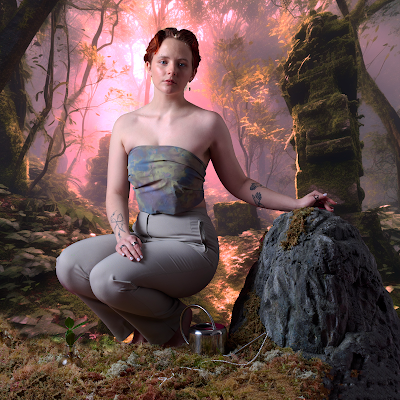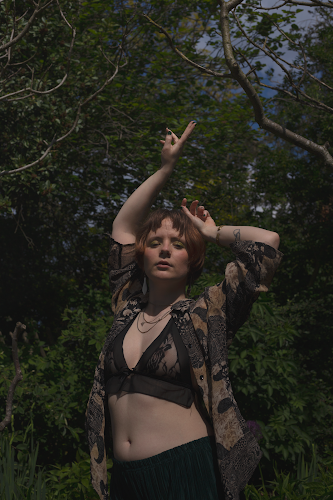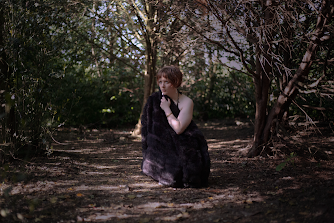“Medusa” by Serena Clara
Serena Clara’s style defies the boundaries of genres and fuses poetic elements with pop melodies. She has been likened to influential art-pop artists such as Kate Bush and Caroline Polachek, who have inspired her musical vision. She composes captivating lyrics and produces dynamic sounds in her modest bedroom studio, where she experiments with different instruments and effects.
“Medusa” is a song of many parts and shades, inspired by the ancient myth of scorn and snakes. It questions the story with a keen eye, seeing the antihero’s curse as a wound that won’t heal and her fate as a way of shaming the wronged.
It links her pain to the pain of many others who have suffered violence and injustice in silence. The song shows Medusa’s path of recovery as she transforms in her lonely tower and finds meaning and power in her past. It’s a realm for righteous fury and the release of shame.
What's the story behind Serena Clara’s art and who is she as a person?
I’ve always indulged in making extremely expressive music. I love drama and theatrics and the scope that gives me creatively to explore and emotion or circumstance. Getting stuck into a concept is so addictive to me, so getting into intricate details and developing a world around the music is something very important to me.
Ironically as a person, I’ve been told I have quite a grounded and calming energy, so I guess my chaos is channelled into the art! For those who subscrible to astrology, my big three is Libra, Taurus, Libra, so that tells those people all they need to know!
I’m amazed and captivated by “Medusa”. What or who was the source of your inspiration?
Thank you so much! I’m really glad it resonated. I wrote this with the intention of showing the way that stories can be shifted to suit a particular narrative. The true story of Medusa sees her being banished and cursed for being sexually assaulted by Poseidon. When I discovered this I couldn’t help but see the parallels between that myth and reality. Victim blaming and shaming is still so present in our culture as humans. That said, I didn’t want to focus on her suffering and trauma too much as I felt that it had defined her in this ancient story for too long. Instead the focus is on the healing process, set in the forest she was banished to. Facing her trauma and reclaiming her worth, feeling righteous anger and blooming in the face of it. In my version of the story she isn’t a monster slain, she’s a woman going through rebirth.
What can you tell us about the EGOKIN series that features “Nook” and “Medusa”?
EGOKIN is a self-defined term that means ’self-as-family’. It’s a project I’m slowly building through music with all he tracks existing in a universe of inner ecosystem building. Using home grown tools from your life experience to create a habitat to help you thrive. Nook was the act of chosing the self and finally discovering that place we all have in ourselves. Medusa represents the first seeds sown in this new habitat. Lots more growth to do, but some beautiful realisations nonetheless.
What influences your music and stories when it comes to songwriting?
The majority of my conceptual inspiration comes from my own lived experiences. I grew up singing folk and storytelling has always played a part in my songwriting process. That’s also why movies and folk-lore are so compelling to me. Alongside that candid storytelling approach, I’m also a big fan of hyper descriptive poetry that needs a bit of decoding and can take on multiple meanings. Emily Dickinson, for example, did that wonderfully. The goal is to create a rich landscape with elaborate lyrics and texture, and then ask you to walk through it and discover the story. It absolutely must be a journey.
You have worked with Maddie Ashman in a collaboration. How was the experience?
Maddie is an incredible artist and musician and I was so blessed to have her play on Medusa. We both have an affinity for experimental sonic landscapes and the playfulness that exists there, so our synergy was effortless.
What was also brilliant was her effortless technicality. I’m such a ‘big-stroke’ artist and music therory has never been my strong point, so having someone who could translate my vagueness into something beautiful and deliberate was so satisfying. I think the session only needed 2 hours, it was magic!
What tools or techniques do you use to create your impressive soundscape?
Experimentation. It takes me quite a while because my production vocabulary and understanding is pretty limited, but I have to say 80% of my production is made up of happy accidents. I worked on my last 2 singles with my partner Jury who is an exceptional producer and is able to polish my sketch ideas and add stunning flourishes to a soundscape. He get’s very creative with it. He introduced me to the concept of adding layers that can be felt but can’t be heard and he’s an expert at that.
Being an indie artist can be very time-consuming. How do you handle that?
You can say that again! I think I’m still learning how to handle the burn-out that comes from being independent and self-funded. I have two jobs alongside all the music business hats I have to wear, so making time for the creative process as well as rest and recreation is heavy on my mind at the moment. I've not sussed it out yet, but practice makes perfect. All that said, I do love the creative freedom it gives me, plus It’s making me extremely efficient and resilient to criticism!
... and finally, what are some of the projects or plans that you have in mind for the near future?
My main focus is currently on developing EGOKIN. I haven’t yet decided on what the next single will be, but I’m hoping not to keep it locked away for too long!
Something else that I am really eager to get back into is playing live - I love performing more than anything. I used to play a fair bit pre-pandemic, but my project has evolved so much since then that I needed to take a break to focus on developing the ideas first. My current plan is to put on a cabaret style gig with a queer, multidisciplinary line up.
I want a Serena Clara live show to be high drama, but I also want the atmosphere to feel full and nourishing. As a queer person, those are the only event spaces that do that for me, so I hope that I can be a part of sharing that with my audience.


